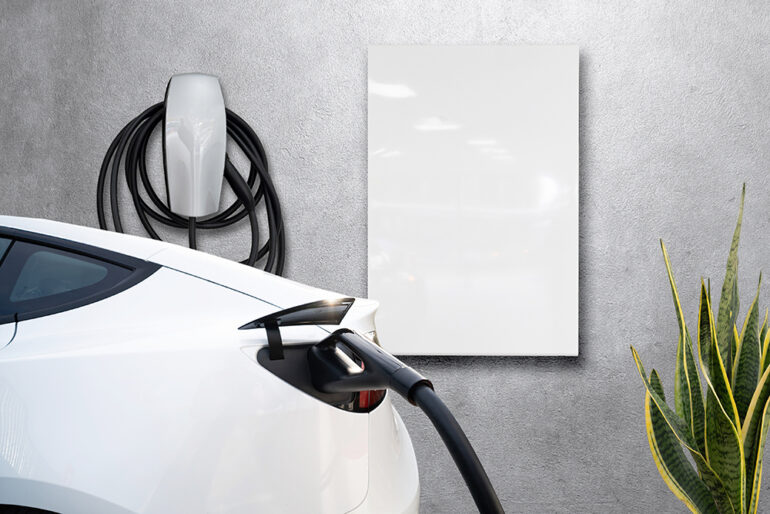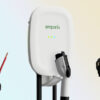Ready to take your electric vehicle charging to the next level? With a level 2 charger installed in your home, you’ll get the convenience of filling up your batteries while you sleep at night and the energy-saving benefits that come with charging during off-peak hours. Here are the best level 2 EV chargers to install in your home and how to make sure you get the right charger for you and your electric car.
Read More: EV charging guide
Lectron NEMA 14-50: Best Portable EV Charger
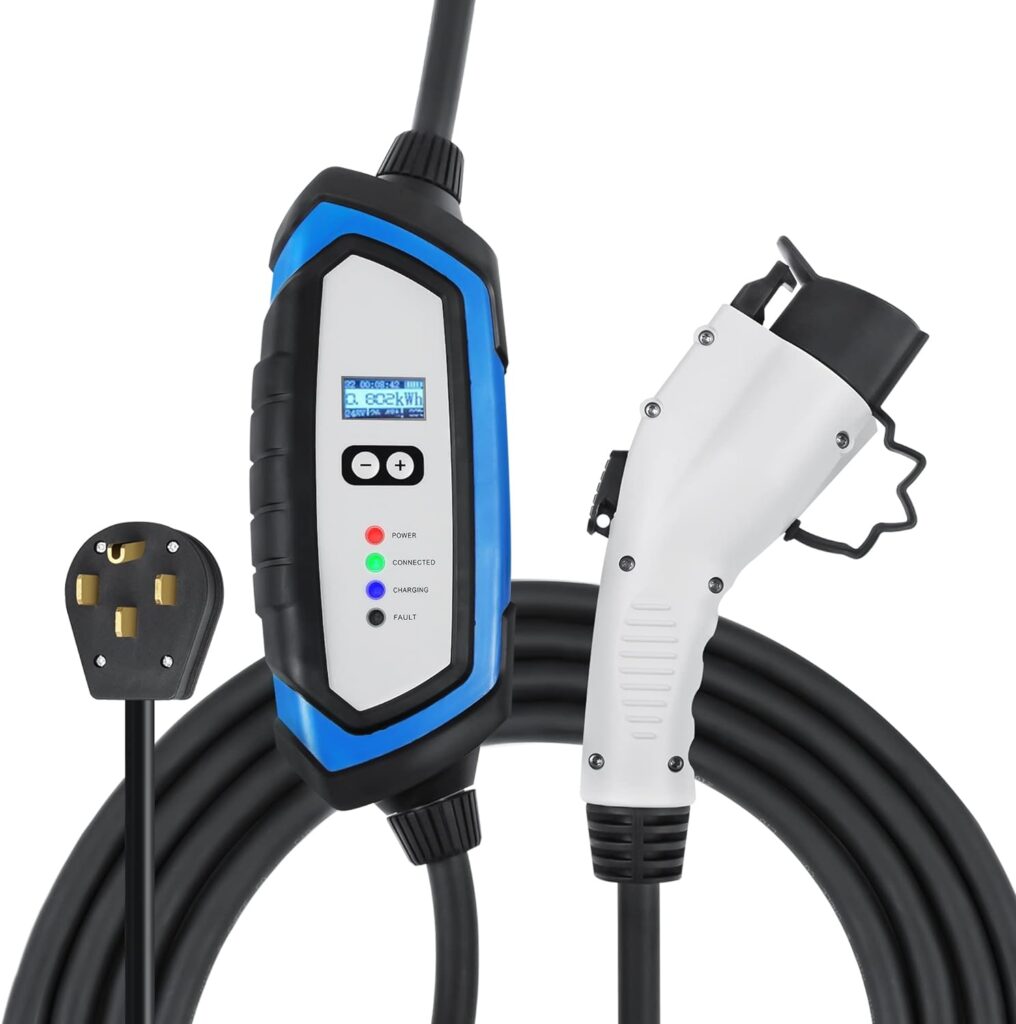
- Connector Type: J1772
- Max Charging Speed: 9.6kW (32 amps)
- Hardwired or Plug-In: Plug-in (NEMA 14-50)
- Cable Length: 21 feet
If you don’t want to install an EV charger on your wall or you just want to keep a charger in your trunk in case of emergencies, the Lectron portable charger is one of your best options. This level 2 charging cable can deliver speeds up to 7.7kW (at 32 amps), which is over five times faster than a level 1 charging cable.
In fact, the Lectron is fast enough to charge a 60kWh battery to 80% in around eight hours. So, you can totally use this as an everyday charger, as long as you have a NEMA 14-50 outlet. This charger doesn’t come with a companion app, but you can see some vital information about the charging process with the built-in LED indicators.
Read More: Level 1 vs level 2 EV chargers
Emporia: Best Budget EV Charger
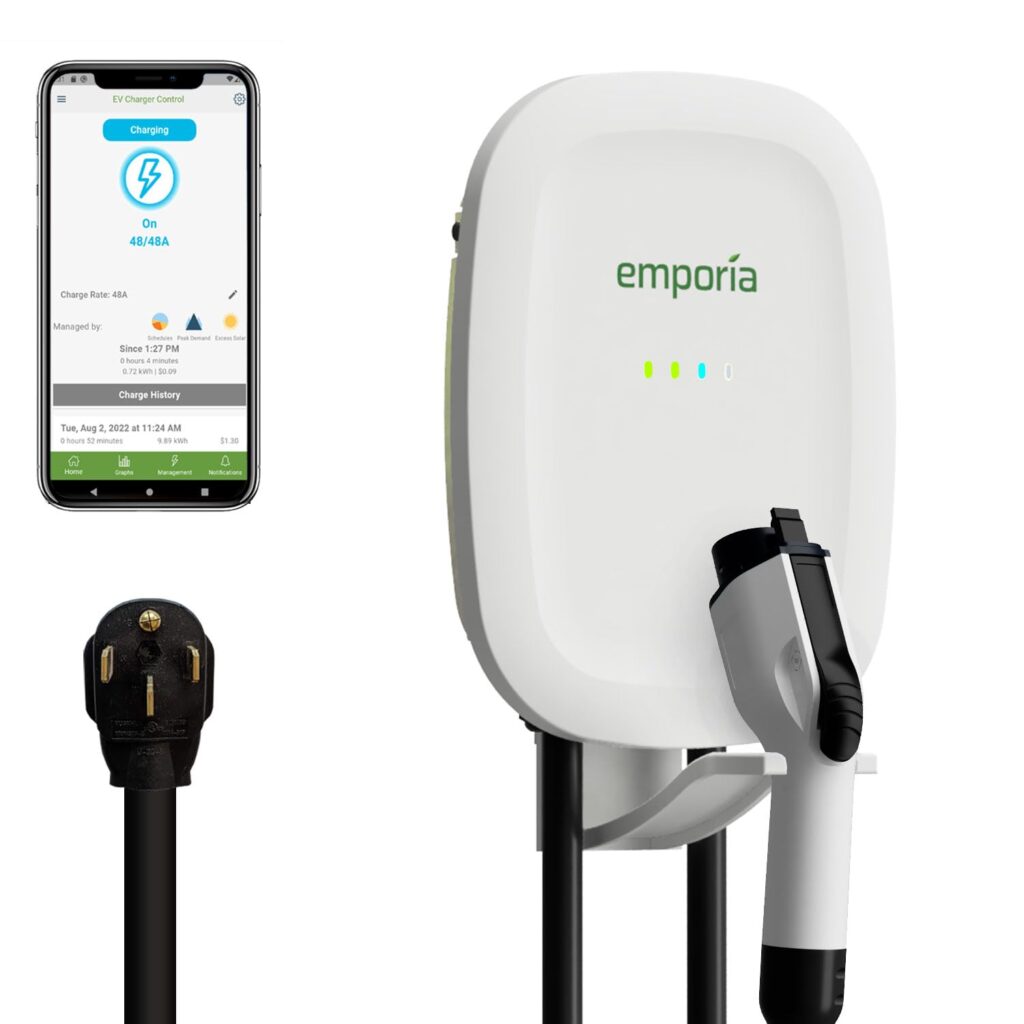
- Connector Type: J1772
- Max Charging Speed: 11.5kW (6-48 amps)
- Hardwired or Plug-In: Hardwired or Plug-in (NEMA 14-50)
- Cable Length: 24 feet
Emporia makes some of the cheapest EV chargers on the market, and they can save you even more money in the long run. Along with EV chargers, Emporia also has a line of energy-saving devices, from smart outlets to solar panel batteries, which can store as much as 80kWh of electricity.
With a full Emporia setup, it’s possible to automate your charging schedules so you only use excess power from your solar panels, which means you won’t have to spend a dime charging your car again. This EV charger delivers up to 11.5kW of power when hardwired, and it comes with some of the best energy-monitoring features to help you save money on your electricity bills.
Read More: How much does it cost to charge an EV?
Grizzl-E Smart: Best Weatherproof EV Charger
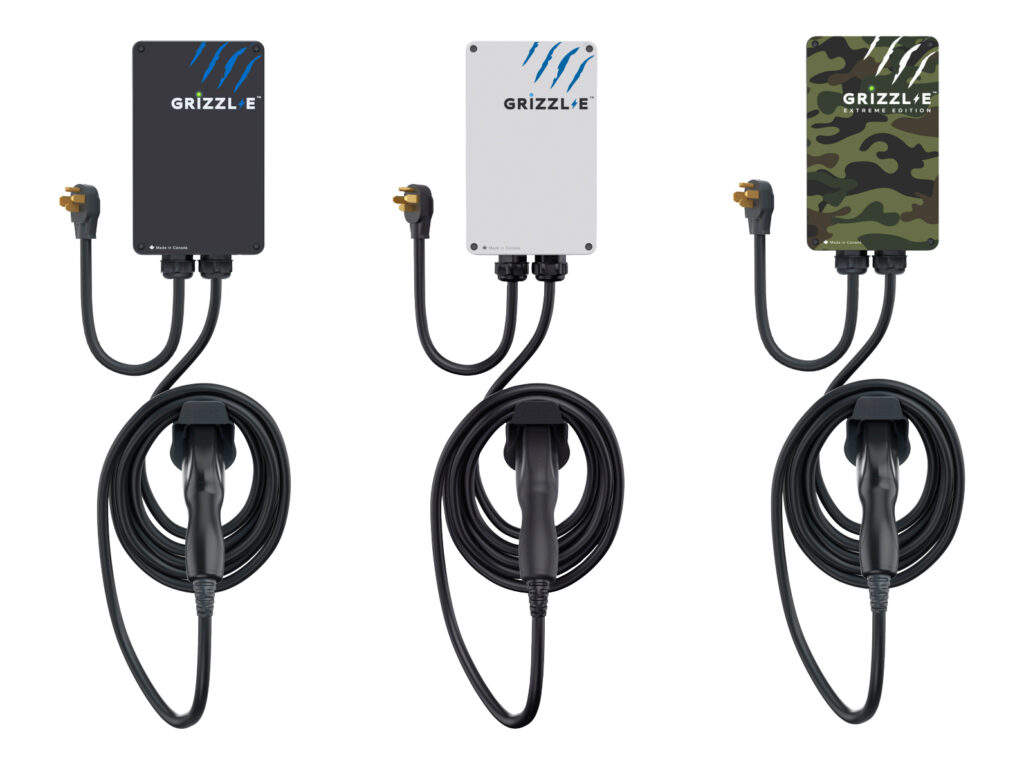
- Connector Type: J1772
- Max Charging Speed: 9.6kW (16-40 amps)
- Hardwired or Plug-In: Hardwired or Plug-in (NEMA 14-50, NEMA 6-50)
- Cable Length: 24 feet
Grizzl-E is one of the cheapest wall-mounted EV chargers you can find, but it’s one of the best options for installing outdoors, especially in colder climates. Made in Canada, this no-frills EV charger has thick cables and a heavy-duty NEMA-4 aluminum enclosure, which means it can handle the harshest weather conditions.
This charger can deliver up to 9.6kW of power at 40 amps, which is more than enough to charge most EVs overnight. This smart EV charger can even connect to different apps. So, if you use Electrify America public charging stations, you’ll also be able to use the same app to control your charger at home.
If you have more than one EV, the Grizzl-E Duo comes with two 24-foot cables for dual charging.
Tesla Wall Connector: Best for Tesla Owners
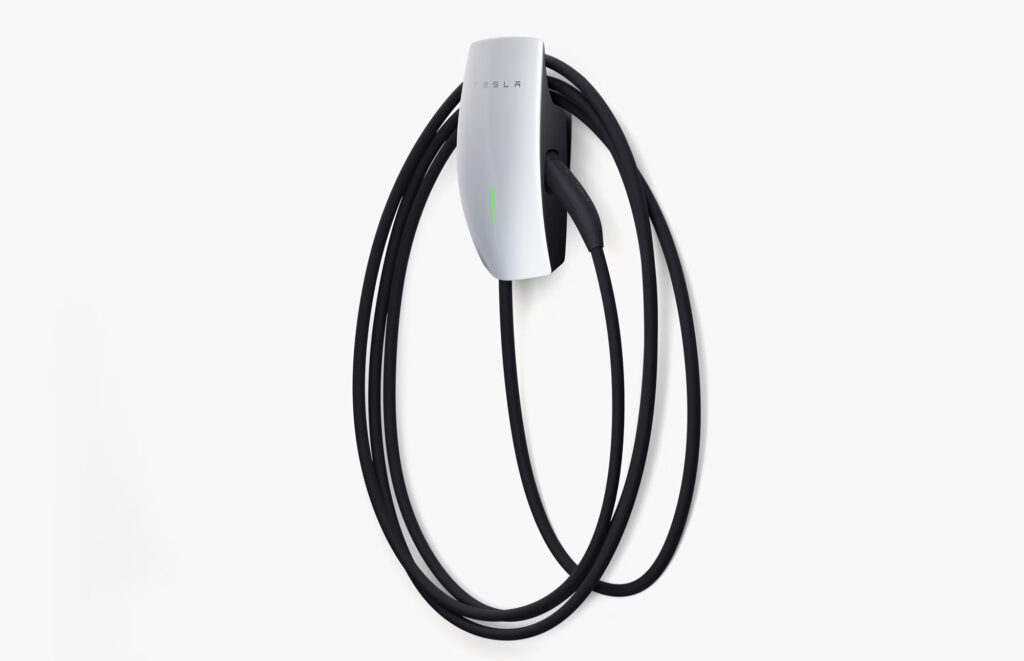
- Connector Type: NACS and J1772
- Max Charging Speed: 11.5kW (
- Hardwired or Plug-In: Hardwired Only
- Cable Length: 24 feet
If you own a Tesla, the Tesla Wall Connector is the best charger to install in your home. This small and sleek charger has a convenient hook no the back, which makes it easy to manage the 24-foot cable. It’s also able to deliver 11.5kW at 48 amps, which is the maximum amount of power that any modern Tesla can receive.
Storage
Read More: How long does it take to charge a Tesla?
The Tesla Wall Connector comes with tons of features in the smartphone app to help you monitor and control your energy use. However, this charger can not be plugged in, so you’ll need to contact a professional electrician to install it for you. If you need to plug your Tesla into a 240-volt outlet, there are Mobile Connectors.
Top-of-class warranty
If you ever invite other EV owners to your home, the Tesla universal connector will allow you to charge any NACS and/or J1772 electric car.
What To Look For In an EV Charger
If you’re looking to install a level 2 EV charger to install in your home, the first thing you should do is make sure it has the same connector as your electric car. You should also get a charger that can deliver at least 7.7kW (32 amps) of power or more, depending on your on-board charger’s power rating.
Read More: How to choose the right EV charger
Types of EV Connectors
In the US, there are really only two types of charging ports built into electric cars. All Tesla cars now use an NACS (North American Charging Standard) connector, while all other electric cars use an SAE J1772 connector. You should only get an EV charger that has the same type of connector as your electric car.

While you can use an adapter to charge your electric car, it’s not advisable to do so on a regular basis.
How Much Power Does Your EV Charger Need?
Before you install an EV charger in your home, it’s important to check your on-board charger. All electric cars have an on-board charger to convert alternating current (AC) into direct current (DC). The power rating of your on-board charger will determine the maximum charging speed you’ll get from level 2 chargers.
For example, if your EV’s on-board charger is rated at 7.7kW, and you connect to an 11.5kW charger, it will only charge at 7.7kW. So, basically, you want to look for a charger that can supply as much power as your on-board charger can receive – or more.
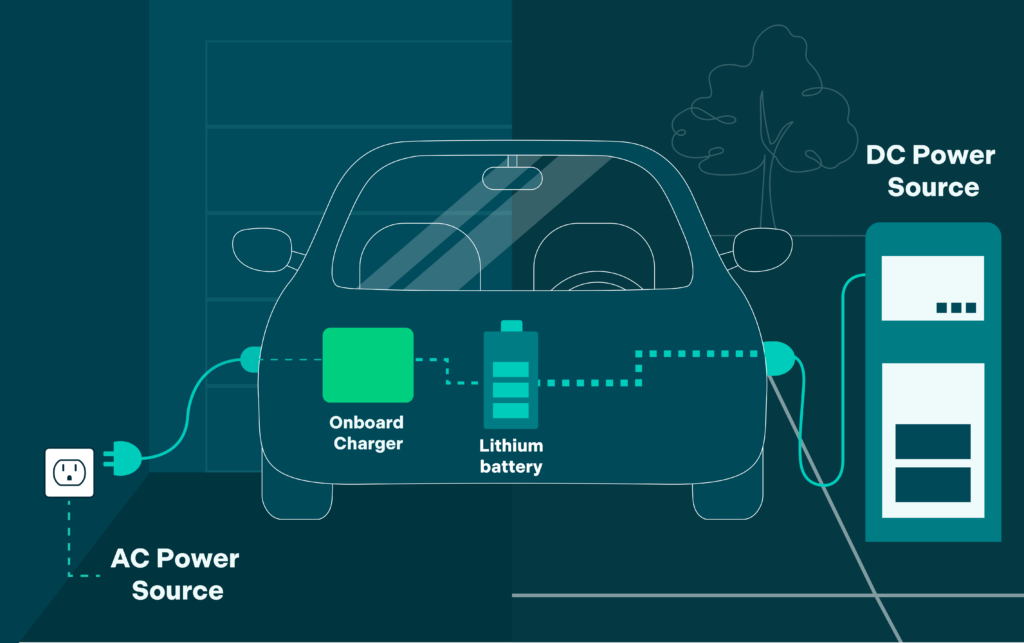
All level 2 EV chargers carry 240 volts, which is why you might see the power output of a charger listed in amps instead of kilowatts (kW). To find the actual power output of an EV charger, all you need to do is multiply the volts (240) by the amps. This will give you the total watts, and you can divide that number by 1,000 to calculate the kilowatts.

For example, if you see a 32-amp charger, that means it can deliver 7,680 watts (or 7.7kW). However, some EV chargers will list the maximum amps a charger can handle rather than the actual amps that can be used to charge an EV.
Read More: How long does it take to charge an electric car?
Hardwired vs Plug-in EV Chargers
When choosing an EV charger, one of the most important things to consider is whether you want to hardwire it directly to your circuit breaker or if you just want to plug it into a 240-volt wall outlet. Hardwired chargers are safer, easier to use, and deliver more power, while plug-in chargers are easier to upgrade.
The US National Electric Code (NEC) says all EV chargers use a “continuous load,” and by law, they can only deliver 80% of the maximum charge at any time. Since NEMA outlets can only deliver up to 50 amps, the most you’ll get from a plug-in charger is 40 amps (or 9.6kW). On the other hand, hardwired chargers are able to handle 60 amps or more.
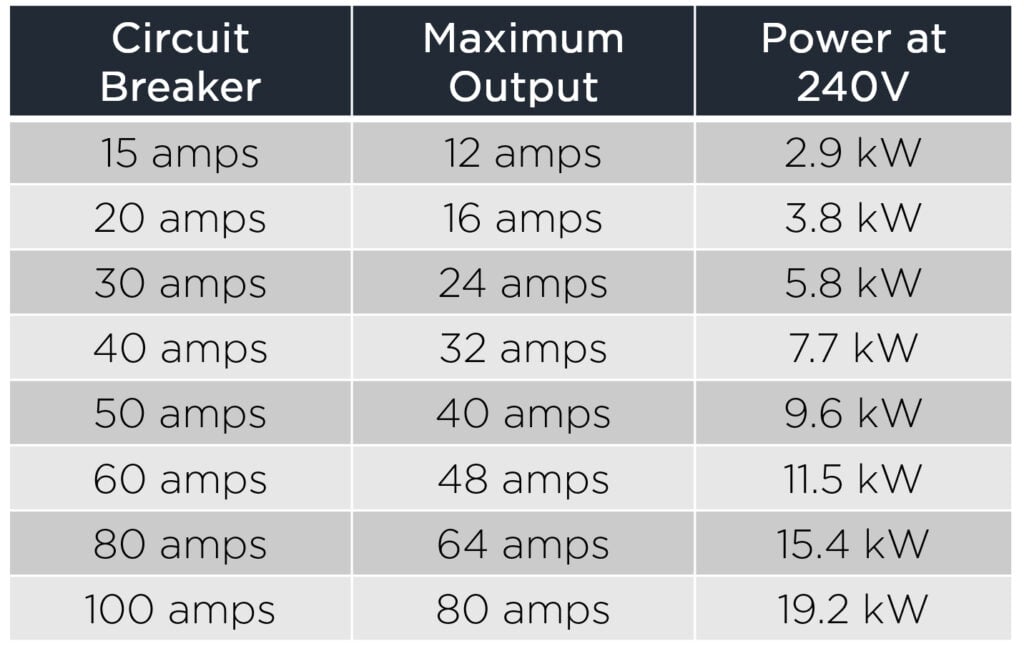
Plug-in chargers can also suffer from “nuisance tripping,” which can cause your power to go out regularly. The NEC now requires all 240-volt outlets to have GFCI protection. Since most EV chargers already have GFCI protection built-in, the two GFCI breakers can trip each other and cause your power to trip. So, it’s best to choose a hardwired EV charger whenever possible.
Which NEMA Outlet Should You Use?
When installing a plug-in EV charger in your home, not all NEMA outlets will give you the same amount of power. You’ll get the fastest charging speeds from NEMA 6-50 and NEMA 14-50 outlets, which can both deliver up to 9.6kW. The next-best choices are NEMA 14-30 and NEMA 10-30 outlets, which can deliver 5.8kW.
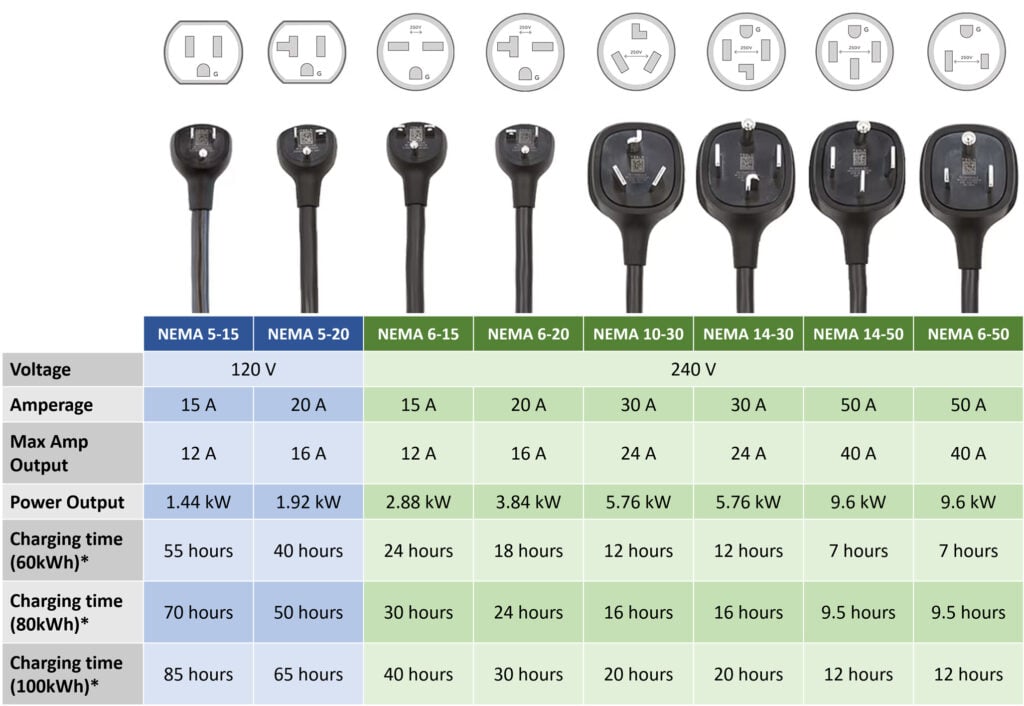
If you’re thinking about installing an EV charger in your home, HelloTech can send someone to provide a free in-home estimate. Our electricians will check your circuit breaker, assess the proposed installation location, and answer any EV charging questions you have – all for free.
